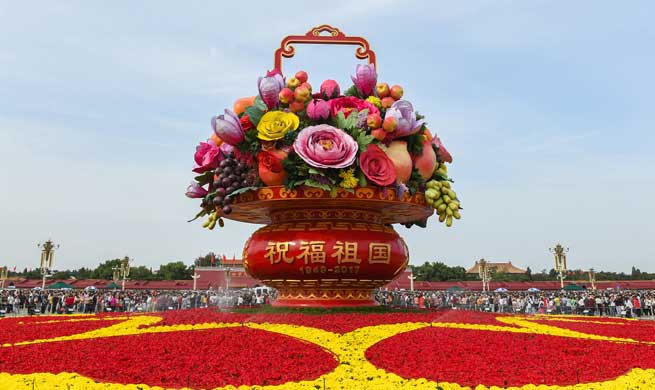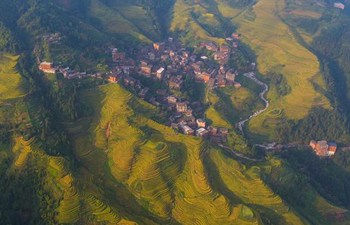FUZHOU, Oct. 2 (Xinhua) -- Chen Wenhuo was a tea farmer, a common occupation in the mountains of southeast China.
The province of Fujian is known to produce some of the best tea in China and has a long history of trading tea.
Having been moderately successful growing tea, Chen decided five years ago that he wanted to do something else and chose to farm Tibetan pigs, something quite novel in his part of the world. Tibetan pigs are obviously accustomed to life in the thin air of plateau regions, so no one really knew how they would react when they were brought to the lowlands.
Chen spent 1.5 million yuan (230,000 U.S. dollars) on 400 piglets and spent the next two years raising them in intermediary locations between the Qinghai-Tibet plateau and the hills of Fujian, about 3,000 meters below their natural home.
"My primary concern was to let the pigs feel at home," Chen said.
He lets them roam free in a 3,000-hectare mountain forest and the pigs, though far away from home, had a much wider dietary choice in the mountain forests of Fujian. There are many delicacies they could not find in Tibet.
Chen immediately liked his pigs and it turned out that Tibetan pigs were easier to raise than Fujian breeds.
"They behave themselves and never make a mess in the barn," said Chen, "They're also smart. They even dig tunnels to make dens. The largest den can accommodate 20."
The herd has grown from 400 to more than 3,000.
There is a reason why Chen chose to raise Tibetan pigs. People in Fujian were among the first to get rich in modern China. As their wallets bulge, they are not satisfied with just eating a lot, they want to eat well.
Wooly black Tibetan pigs are much smaller than ordinary ones. The meat is delicious and rich, much tastier than the local penned ones produce and Chen has never fed his pigs growth hormones. It took much longer for them to grow to 45 kg -- the optimum slaughter weight -- but the extra effort was worth it.
The market responded well and Chen put a very high price on the meat.
The business was so good that he has thought about expansion. "In 2019, our farm will probably have more than 10,000 pigs," he said.
Chen's shift of business fits well in the government's plans for supply-side structural reform. The former tea farmer is constantly looking for more business opportunities as customers' expectations change.
Last year, he turned his pig farm into a tourist resort, attracting56,000 visitors, boosting his confidence.
"Tourists come to enjoy tranquil rural life," said Chen, "They like to stay in the village houses, appreciate landscape, drink oolong tea and, of course, eat Tibetan pork."
Chen's hopes for his pigs are far more than that. He even dreams of holding hog Olympics one day.
"I've reserved a place on my farm to build the competition ground," he said, "Running fast and jumping high, my pigs will win the gold medals."

















